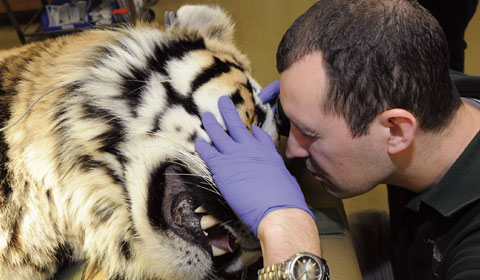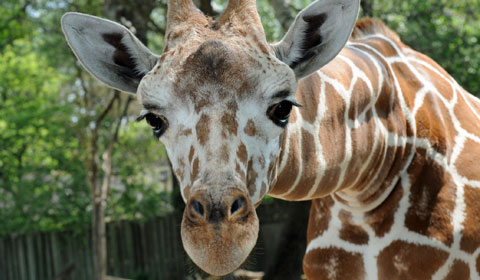News Release
Contact: Sondra Katzen, Public Relations, 708.688.8351, sondra.katzen@czs.org
June 21, 2023
FOR IMMEDIATE RELEASE
NOTE: Scroll to end of press release to download photos.
Giraffe at Brookfield Zoo Expecting Calf Thanks to Innovative Medical Care during Pregnancy
Brookfield, Ill. —Today, June 21, being World Giraffe Day—a day to celebrate the tallest land mammal—the Chicago Zoological Society (CZS) is happy to announce that its animal care and veterinary staff will soon be on baby watch with the expectant birth of a reticulated giraffe at Brookfield Zoo. Arnieta, the 16-year-old mother, is due to deliver sometime between mid-July and late August. Since learning of her pregnancy last summer, Zoo veterinarians and animal care staff have been making every effort to help ensure Arnieta is successful in maintaining this pregnancy and delivering a healthy calf.
Arnieta was paired with Ato, who arrived at Brookfield Zoo in 2017 when he was nearly 2 years old. His arrival was based on a recommendation from the Association of Zoos and Aquariums’ (AZA) Species Survival Plan (SSP), which is a cooperative population management program for select species in accredited North American zoos and aquariums. Each plan manages the breeding of a species to maintain a healthy and self-sustaining population that is both genetically diverse and demographically stable. After waiting a few years until Ato reached sexual maturity, Arnieta conceived but experienced miscarriages in 2020 and 2021, both in the first trimester.
Following the miscarriage in 2021, CZS staff began working with reproductive experts at Omaha’s Henry Doorly Zoo and Aquarium to monitor and evaluate Arnieta’s urine hormones to identify if she was cycling normally. Test results confirmed she had the ability to potentially become pregnant. Then, in July 2022, animal care staff began seeing signs that Arnieta might be pregnant, and urine samples from the hopefully expectant mom were once again sent to the Nebraska zoo, where Dr. Monica Stoops, director of reproductive sciences, and her team reported a positive pregnancy test the following month. The two facilities collaborated and borrowed knowledge from both animal and human medicine to create an innovative medical plan based on the understanding that Arnieta's previous pregnancy losses may have been related to a lack of hormone production and/or potentially an infection.
“Our team at Omaha’s Henry Doorly Zoo and Aquarium is honored to have collaborated with Brookfield Zoo on this special partnership to support Arnieta in a healthy pregnancy,” said Dr. Stoops. “It’s through collaborations like these that veterinary teams from across the country are able to learn, share, and advance zoo science together, and we’re cheering for Arnieta and her calf from here in Omaha.”
Four months into the 14½- to 15-month pregnancy, Arnieta’s care team started her on a regimen of liquid synthetic progesterone mixed in beet pulp and prophylactic antibiotics placed between leaf lettuce or kale to help her hormone levels stay intact and prevent the risk of infection. Arnieta’s care, along with the supportive veterinary interventions, included training Arnieta for voluntary blood and urine collection, have been key to monitoring her pregnancy over the last several months.
With the expected due date approaching, Arnieta has been weaned off the progesterone to help ensure the pregnancy does not last longer than normal gestation and so she can experience a natural labor and birth process. The staff is eager for a healthy mother and calf but prepared for every outcome.
“Every birth/hatch at the Zoo is a very big deal—from a Guam kingfisher to a giraffe—and includes a lengthy birth plan with prepartum and postpartum considerations. Arnieta’s birth plan is no exception. Similar to human assisted reproduction, there are potential risks, so Arnieta’s plan included specific guidelines to ensure she gives birth on time and in a manner similar to giraffes in the wild,” said Dr. Copper Aitken-Palmer, senior staff veterinarian for CZS and vice chair for the Association of Zoos and Aquariums’ (AZA) Reproduction and Endocrine Scientific Advisory Group. “We’re encouraged and motivated by the innovative work done by her care team, which will be shared with the broader zoological field to help other animals, especially those endangered, see a greater rate of reproductive success in the future.”
It is typical for female giraffes to temporarily leave their herd before giving birth for the safety and privacy of the mother and calf. As her due date approaches, Arnieta will be separated from the other giraffes at Brookfield Zoo and provided with a private birthing stall and outdoor area. During this time, she will still have visual access to the rest of the herd and will be under 24/7 supervision by the animal care staff. Arnieta is a favorite among zoogoers. Staff who care for her describe her as having a lively personality that shows through her strong opinions about her care, diet, and participation in training, as well as her love of food.
“We are excited about the potential for Arnieta to have her first successful birth in more than 10 years,” said Dr. Mike Adkesson, president and CEO of the Chicago Zoological Society and director of Brookfield Zoo, “And, we are proud of the collaborative efforts our dedicated teams both here at Brookfield Zoo and at Omaha’s Henry Doorly Zoo and Aquarium have done to help Arnieta sustain this important pregnancy. Hopefully, the knowledge learned from her case will be useful in assisting other zoological experts in providing infertility care to not only giraffes but other species that may have complications during pregnancies.”
Brookfield Zoo has been home to giraffes since opening its doors in 1934, with the first successful birth in 1940 and 59 births since then. In 2018, the reticulated giraffe’s status was listed as endangered by the International Union for Conservation of Nature and Natural Resources (IUCN). The Giraffe Conservation Foundation (GCF) estimates that only about 16,000 individuals remain in their native habitat. Causes for the decline of reticulated giraffes include habitat loss and fragmentation, increased poaching, and political unrest. To raise support and create awareness about the challenges that all giraffe species face in their native habitat, GCF initiated the first World Giraffe Day in 2014. It is celebrated annually on June 21, the longest day of the year in the northern hemisphere.
Through AZA’s SAFE (Saving Animals From Extinction) program, accredited zoos, including Brookfield Zoo, and their partners are working collectively to help save giraffes through education, scientific study, fieldwork, public awareness, and action. As efforts continue to ensure a growing giraffe population, Brookfield Zoo is committed to advancing how zoological experts can expand prenatal care for the species.
# # #
Photo Captions (credit: Jim Schulz/CZS-Brookfield Zoo)
3983 and 5391: Arnieta, a 16-year-old reticulated giraffe at Brookfield Zoo, is due to give birth to a calf sometime between mid-July and late August.
5408: Kate Jungiewicz, an animal care specialist at Brookfield Zoo, feeds Arnieta, a pregnant 16-year-old reticulated giraffe, prophylactic antibiotics hidden between leaf lettuce. After two previous miscarriages and based on the understanding that Arnieta's previous pregnancy losses may have been related to a lack of hormone production and/or potentially an infection, four months into her pregnancy, staff started Arnieta on a regimen of liquid synthetic progesterone and prophylactic antibiotics to help her hormone levels stay intact and prevent the risk of infection.
5431 and 5482: Kate Jungiewicz, an animal care specialist at Brookfield Zoo, feeds Arnieta, a pregnant 16-year-old reticulated giraffe, beet pulp that is mixed with a liquid synthetic progesterone. After two previous miscarriages and based on the understanding that Arnieta's previous pregnancy losses may have been related to a lack of hormone production and/or potentially an infection, four months into her pregnancy, staff started Arnieta on a regimen of liquid synthetic progesterone and prophylactic antibiotics to help her hormone levels stay intact and prevent the risk of infection.
8817: Dana Vinci, a lead animal care specialist at Brookfield Zoo, feeds Arnieta, a pregnant 16-year-old reticulated giraffe, beet pulp that is mixed with a liquid synthetic progesterone. After two previous miscarriages and based on the understanding that Arnieta's previous pregnancy losses may have been related to a lack of hormone production and/or potentially an infection, four months into her pregnancy, staff started Arnieta on a regimen of liquid synthetic progesterone and prophylactic antibiotics to help her hormone levels stay intact and prevent the risk of infection.
8626: Dana Vinci, a lead animal care specialist at Brookfield Zoo, places prophylactic antibiotics between leaf lettuce to feed to Arnieta, a 16-year-old pregnant reticulated giraffe.
5356: A liquid synthetic progesterone is mixed with beet pulp, which is being fed to Arnieta, a 16-year-old pregnant reticulated giraffe.
About the Chicago Zoological Society
The mission of the Chicago Zoological Society is to inspire conservation leadership by connecting people to wildlife and nature. The Chicago Zoological Society is a private nonprofit organization that operates Brookfield Zoo on land owned by the Forest Preserves of Cook County. The Society is known throughout the world for its international role in animal population management and wildlife conservation. Its Center for the Science of Animal Care and Welfare is at the forefront of animal care that strives to discover and implement innovative approaches to zoo animal management. Brookfield Zoo is the first zoo in the world to be awarded the Humane Certified™ certification mark for the care and welfare of its animals, meeting American Humane Association’s rigorous certification standards. The Zoo is also accredited by the Association of Zoos and Aquariums, Alliance of Marine Mammal Parks and Aquariums, and the International Marine Animal Trainers’ Association. Brookfield Zoo is located at 8400 31st Street in Brookfield, Illinois, between the Stevenson (I-55) and Eisenhower (I-290) expressways and also is accessible via the Tri-State Tollway (I-294), Metra commuter line, and CTA and PACE bus service. For further information, visit CZS.org.
MEDIA CONTACT:
Sondra Katzen
Director of Public Relations
Office: 708-688-8351
Cell Phone: 708-903-2071
E-mail: Sondra.Katzen@CZS.org

Read about our innovative practices in animal welfare to ensure the ultimate care of our individual animals.

Create extraordinary connections with animals and nature!

Become our partner in caring for animals and in connecting people with wildlife and nature.